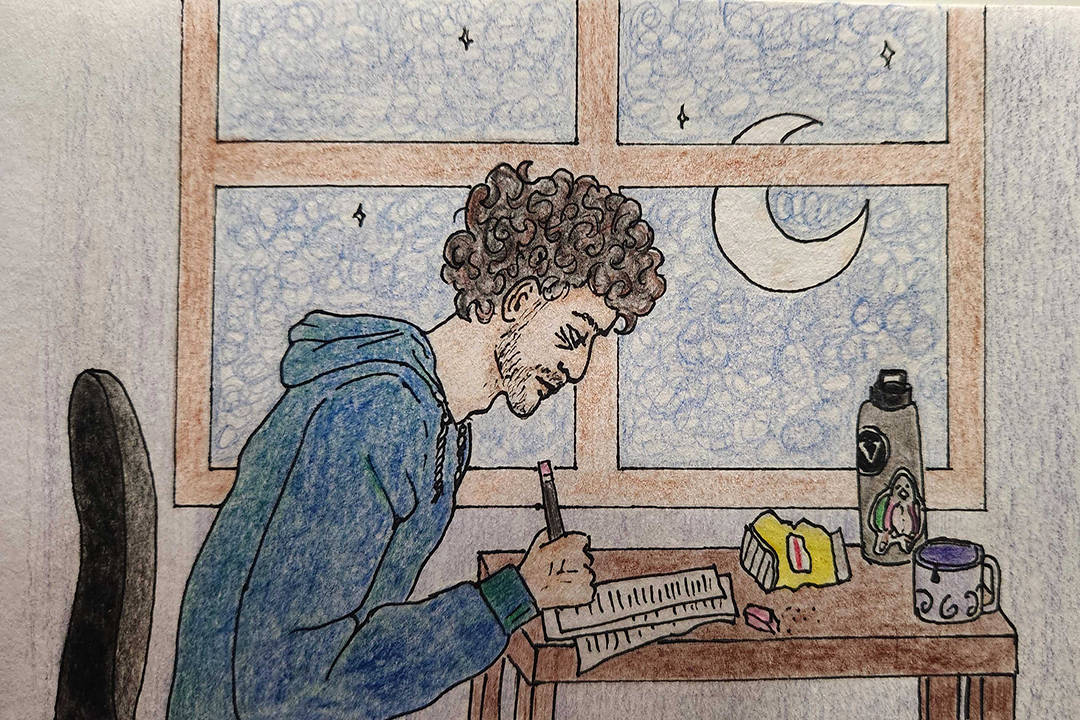We’ve all been there: surrounded by snacks, body hunched over your laptop, eyes fixated on the screen while furiously typing into the wee hours of the morning, with no plans to sleep soon.
As we’re thrust at full force into another semester, all-nighters seem all too possible. Each time you find yourself awake in the early hours — whether it be from working, socializing, studying, or scrolling — the guilty feeling from failing to abide by your New Year’s resolution to get more sleep likely continues to haunt you.
Perhaps that guilt might ease knowing that your short-term sleep loss may temporarily boost your mood. Yes, you read that right; no, you’re not just tired. A group of neurobiology researchers at Northwestern University, investigating the effects of brief sleep loss using mice, have found that pulling an all-nighter may lead to us feeling happy and giddy afterward.
In their 2024 study published in the journal Neuron, the Northwestern researchers investigated the impacts of sleep deprivation on affective disorders, in hopes of developing more effective treatments. Affective disorders are mental health conditions characterized by disruptions in emotion, often in the form of depressive states or manic states. As such, common affective disorders include depression and bipolar disorder.
You might have already noticed that you have more energy, or that you feel wired, after staying up all night. This feeling, researchers believe, is the result of an increase in dopamine in the brain, evidenced by the sleep-deprived mice in the study.
The neurotransmitter dopamine, known for its role in pleasure and rewards, contributes to the transitions between different emotional states in healthy subjects and patients with mood disorders. For this reason, people with affective disorders may use antidepressants, which limit the reuptake of dopamine — that is, the reabsorption of dopamine into the neuron that released it. Normally, when dopamine is released, it only lasts a certain amount of time before it is reabsorbed, but antidepressants let dopamine last longer before reabsorption, leading to greater dopamine levels so that people can maintain feelings of pleasure and satisfaction for longer.
A 2011 review by Colleen A. McClung, a chronobiologist and neurobiologist at the University of Pittsburgh, showed that manipulating one’s sleep schedule can change one’s affective state by changing one’s dopamine level. This new study furthers these findings by demonstrating that sleep deprivation can reverse depressive episodes and induce manic ones.
Researchers also observed that the mice’s synaptic plasticity — that is, their neurons’ ability to either strengthen or weaken their connections — was enhanced after a night of no sleep, allowing their mood changes to remain for a few days afterward.
While this mood boost is plenty to be excited about, before you pull out your exhaustive to-do list and resolve to stay up all night, be warned: the effects of missing consecutive nights of sleep have widespread negative impacts on one’s physical health, impaired functioning, and ability to manage stress. Some studies even suggest that being awake for 24 hours is similar to having a blood alcohol concentration of 0.10 per cent. Moreover, long-term sleep loss is associated with a range of health issues including depression, diabetes, heart attacks, and strokes.
Even in the Neuron study, researchers quickly found a downside to staying up in the short term. Alongside the increased levels of dopamine that caused this change in mood, short-term sleep loss in mice resulted in behaviour that was notably aggressive, hyperactive, and hypersexual compared to the mice’s behaviour when they got a regular amount of sleep. While these symptoms disappeared within a few hours, it may not be wise to pull all-nighters solely for the mood boost. Instead, consider doing something active or an activity you enjoy when you’d like to lift your spirits.
As with all things, moderation and maintaining healthy habits are incredibly important. So while these findings might ease your guilt about a one-off sleepless night, it probably should not be motivation for a slew of all-nighters.



No comments to display.